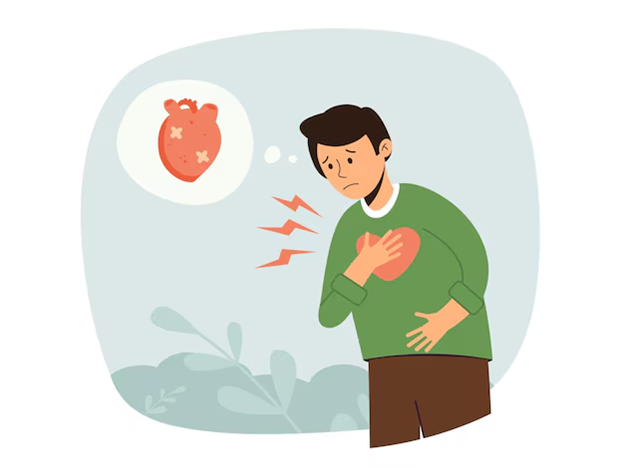




What is the Full Form of RHD?
RHD full form stands for Rheumatic Heart Disease. It is a serious cardiovascular condition caused by repeated rheumatic fever episodes due to an untreated streptococcal throat infection. Over time, heart valves get inflamed, scarred, and damaged, leading to severe health complications, including heart failure.
Read Here to explore RHD's meaning, significance, and related medical aspects.

How Does Rheumatic Heart Disease (RHD) Develop?
RHD is a progressive disease that develops due to repeated episodes of rheumatic fever, an autoimmune response triggered by untreated group A Streptococcus (GAS) infections. The immune system mistakenly attacks the heart, joints, skin, and nervous system, causing permanent heart valve damage.
Strep Throat Infection: A bacterial throat infection caused by Streptococcus.
Rheumatic Fever: If left untreated, it leads to inflammation of the heart, joints, and skin.
Heart Valve Damage: Repeated inflammation scars the heart valves, causing narrowing (stenosis) or leakage (regurgitation).
Severe Heart Complications: If untreated, RHD can progress to heart failure, stroke, arrhythmias, or even death.
Key Prevention Tip: Early diagnosis and full antibiotic treatment of strep throat infections can prevent RHD development.
Who Should I Approach If I Have Rheumatic Heart Disease (RHD)?
If you suspect RHD symptoms, seek medical attention immediately. Consulting the right healthcare professional ensures proper diagnosis, monitoring, and treatment.
General Physician: For initial evaluation and diagnosis.
Cardiologist: For heart function assessment, tests, and treatment plans.
Cardiothoracic Surgeon: If heart valve surgery is required.
Rheumatologist: If autoimmune complications are involved.
Early intervention can prevent serious complications. Don’t delay seeking medical advice!
What Precautions Should Be Followed After RHD Surgery?
Patients undergoing heart valve repair or replacement surgery must follow strict precautions to ensure a smooth recovery.
Routine check-ups with a cardiologist to monitor heart function.
Prevents bacterial infections that can affect artificial valves.
Low-sodium, heart-friendly diet to prevent further complications.
Taking prescribed blood thinners or heart medications as advised.
Gradual recovery with light physical activity.
Maintain good oral hygiene to prevent bacterial infections that can affect heart valves.
How Might Medical Services Hepls in the Reduction of Rheumatic Heart Disease Prevalence?
RHD is a preventable disease, and healthcare services play a vital role in reducing its global burden.
Early Diagnosis & Treatment: Quick identification and treatment of strep throat infections prevent rheumatic fever and RHD.
Access to Antibiotics: Ensuring availability and affordability of penicillin therapy for at-risk populations.
Community Awareness Programs: Educating people on symptoms, risks, and prevention strategies.
Screening & Monitoring Programs: Routine echocardiography screenings in high-risk areas to detect early heart valve damage.
Surgical & Post-Surgery Care: Improved access to cardiac surgeries and post-treatment care for severe cases.
Key Takeaways
RHD full form is Rheumatic Heart Disease, a preventable but serious condition affecting the heart valves.
It develops from untreated strep throat infections, leading to rheumatic fever and permanent heart damage.
Early diagnosis, antibiotics, and timely medical intervention can prevent severe complications.
Proper post-surgery care and medical follow-ups are crucial for RHD patients.
Strong healthcare services and awareness campaigns can drastically reduce RHD cases worldwide.
Conclusion:
Rheumatic Heart Disease is a major global health concern but can be entirely prevented with timely intervention. If you or a loved one experience persistent sore throat or heart-related symptoms, seek medical attention immediately!
FAQs on RHD Full Form - Rheumatic Heart Disease
1. What is the full form of RHD?
RHD stands for Rheumatic Heart Disease. It is a serious condition that affects the heart valves, caused by repeated episodes of rheumatic fever, which originates from untreated strep throat infections.
2. How does Rheumatic Heart Disease develop?
RHD develops when rheumatic fever triggers an immune response that attacks the heart valves, leading to inflammation, scarring, and permanent damage. It usually occurs due to untreated or recurrent streptococcal throat infections.
3. What are the early symptoms of RHD?
Early symptoms may include:
Shortness of breath
Chest pain
Heart palpitations
Fatigue and weakness
Swelling in the legs or feet
Frequent sore throats
4. Who is at risk of developing RHD?
People at a higher risk include:
Children and young adults (5-15 years old)
Individuals with frequent strep throat infections
People living in overcrowded or poor sanitary conditions
Those with a family history of rheumatic fever or RHD
5. How is Rheumatic Heart Disease diagnosed?
Doctors use several tests to diagnose RHD, including:
Echocardiogram (Echo): To assess heart valve damage.
Electrocardiogram (EKG/ECG): To check heart rhythms.
Chest X-ray: To detect heart enlargement.
Blood Tests: To identify past streptococcal infections.
6. Can Rheumatic Heart Disease be cured?
There is no cure for RHD once the heart valves are permanently damaged. However, early treatment with antibiotics and proper medical care can prevent the disease from worsening. In severe cases, surgery may be required to repair or replace damaged heart valves.
7. How can RHD be prevented?
The best way to prevent RHD is by:
Treating strep throat infections promptly with antibiotics.
Following a full course of prescribed medication for rheumatic fever.
Maintaining good hygiene to prevent infections.
Regular health check-ups for those at risk.
8. What happens if RHD is left untreated?
If untreated, RHD can lead to severe complications, including:
Heart failure
Stroke
Irregular heart rhythms (arrhythmias)
Permanent disability or even death
9. What precautions should be taken after RHD surgery?
Patients who undergo heart valve repair or replacement surgery should:
Attend regular follow-ups with their cardiologist.
Take prescribed medications to prevent complications.
Follow a heart-healthy diet and avoid excessive salt intake.
Practice good dental hygiene to prevent infections.
Limit strenuous physical activity and follow medical advice.
10. How can healthcare services help reduce RHD cases?
Healthcare services can reduce RHD prevalence by:
Providing widespread access to antibiotics for strep infections.
Implementing community awareness programs.
Conducting routine screenings in high-risk populations.
Ensuring timely surgical intervention for severe cases.























